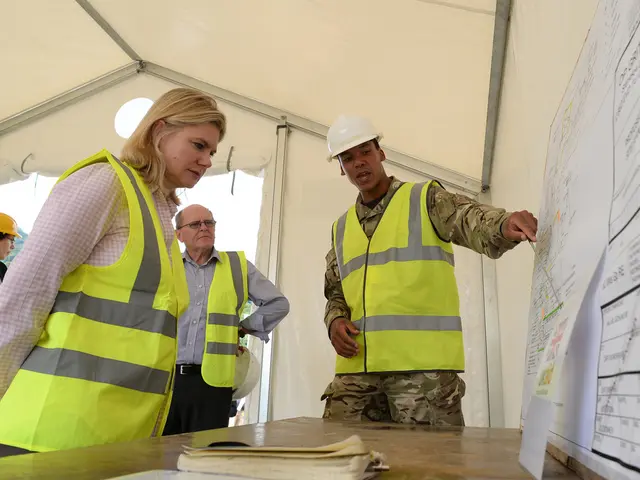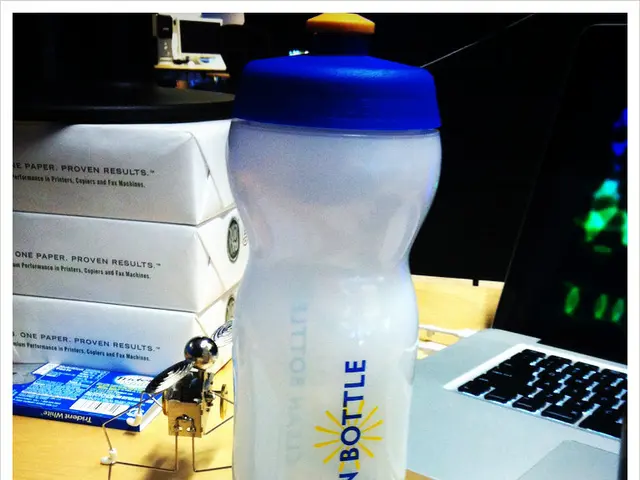Cryptocurrencies reshaping the methodology of academic explorations
Decentralized Science: Unleashing the Future of Research
Scrolling through TikTok one day, I stumbled upon an influencer chatting with Chris Crecelius, founder of AxonDAO, at the Bitcoin conference in Las Vegas. It turns out that Crecelius has been working on medtech solutions since 2013, long before the world even knew about crypto. One of AxonDAO's innovative projects enables people to generate income from their own genetic data—something notable predecessors in the DNA field were charging for and making millions from. With the power of Web3, AxonDAO aims to revolutionize the way science works, connecting everyday individuals with digital replicas of their bodies.
"We all have something valuable for science, for humanity, and now we can digitize our likeness as a perfect machine," says Crecelius in the video. "We can test these things out and understand how our bodies will react."
In this future world, we would have the opportunity to test new medicines and therapies on our digital twins before trying them on ourselves. The possibilities are virtually limitless. The crypto aspect? Invest directly in this project through the tokens that the company issues (Full disclosure: AxonDAO's token is AXGT, and I've owned a little bit of it since last year).
This is just one example of the limitless potential that lies within Decentralized Science (DeSci)—a rapidly growing movement that you might not have heard of yet. Built on the backbone of blockchain technology, DeSci is redefining the funding, conduct, sharing, and review of scientific research. It's not just about technical innovation; it's a philosophical shift. And it might just fix what's broken.
Blockchain—the technology behind Bitcoin and Ethereum—essentially creates a tamper-proof, decentralized digital ledger. No single authority controls it. It's secure, transparent, and immutable—meaning it has never been, and never will be, changed. When applied to science, that means funding decisions can be made by the community. Research data can be verified, peer-reviewed, and stored permanently. Researchers can be directly rewarded. And anyone can participate.
The DeSci space is already abuzz with initiatives that aim to solve long-standing problems within research:
Democratizing research funding: Instead of waiting for grants or institutional support, scientists can now directly fund their projects through their communities. Decentralized Autonomous Organizations like VitaDAO and AthenaDAO allow token-holders to vote on what gets funded, and contributors can even earn a return if the research results in viable products or therapies.
Ensuring transparency: Traditional research is plagued by selective publication, hidden data, and academic bias. With blockchain technology, the entire process—from protocols to results—is open for scrutiny.
Speeding up peer review and publishing: Platforms like ResearchHub are reimagining how research is shared. Instead of costly, biased academic journals, blockchain-based review systems allow open access and community feedback, and contributors can earn crypto tokens for participation.
Expanding global collaboration: Blockchain removes institutional silos, enabling researchers around the world to connect and collaborate seamlessly.
Respecting Data Ownership
AxonDAO isn't the only one offering the chance for people to share their data. GenomesDAO provides individuals the ability to store and control their DNA data, with the option to share it for research and get compensated. This flips the script on major genomics companies that have profited from user data without offering anything in return.
Even intellectual property—one of science's biggest bottlenecks—is being revisited. The NobleBlocks project lets researchers tokenize their discoveries, creating tradeable IP assets that maintain ownership while enabling faster innovation.
It's still early days, but there are already more than 100 DeSci projects underway, including PoSciDonDAO, focusing on sustainable development; HairDAO, researching hair loss; VitaDAO, all-in on longevity; AthenaDAO, dedicated to women—closing the gender gap in medical research.
What I find most compelling about this space is how it encourages participation. You don't have to be a PhD to contribute. You can fund projects, propose ideas, analyze data, or simply help spread the word. For anyone who's ever felt left out of the scientific conversation, this is your invitation.
Realizing this vision isn't just about technical innovation. It's about fostering a cultural shift. By merging blockchain, AI, and community governance, they're putting science back in the hands of the people. While many of these ideas may take years to scale, many projects will fail, and others will soar—and no one knows who will emerge as the leader—but the direction is clear: decentralization isn't just a financial revolution; it's a scientific one. Just like blockchain and cryptocurrency are leveling the playing field in investing, DeSci brings healthcare out of the stifling confines of government labs, questionable peer review practices, and Ivy League universities, creating a light-filled space where everyone can find their place.
- AxonDAO's innovative project, built on Web3, aims to revolutionize science by connecting individuals with digital replicas of their bodies, allowing them to test new medicines and therapies on their digital twins.
- DeSci, a rapidly growing movement built on blockchain technology, is redefining the funding, conduct, sharing, and review of scientific research, enabling anyone to participate and directly fund projects.
- GenomesDAO allows individuals to store, control, and even share their DNA data for research, flipping the script on traditional genomics companies that have profited from user data without offering anything in return.
- NobleBlocks project lets researchers tokenize their discoveries, creating tradeable IP assets that maintain ownership while enabling faster innovation, addressing one of science's biggest bottlenecks.
- Decentralized Autonomous Organizations like VitaDAO and AthenaDAO allow token-holders to vote on what gets funded in science, and contributors can earn a return if the research results in viable products or therapies.






